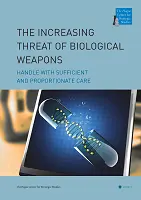With the World Health Organization (WHO), North Atlantic Treaty Organization (NATO), and the U.S. Blue Ribbon panel publishing reports on the emerging risks of biological weaponry in recent months, there is a new sense of urgency regarding biological weapons. In August 2016, the United Nations Secretary General Ban Ki Moon told the Security Council that “non-state actors are actively seeking chemical, biological, and nuclear weapons.” Much of this urgency is owed to technological advances in biotechnology and the concomitant attraction to non-state actors to use biological agents as weapons due to their financial appeal and diverse impact. The relative ease with which biological weapons can be produced, and the intent of non-state actors to use biological weapons- based on historical precedent and recent increases in international terrorism- call for a renewed focus on this field.
This report examines the changing dynamics of the development and use of biological weapons. It explores the increasing sense of urgency by describing which diseases have potentially catastrophic effects if no countermeasures are implemented and how such a catastrophe might take place. Subsequently, the shift in the biological weapons debate from state-centrism to non-state actors, their modus operandi and the development of capabilities, is explored. This is followed by an examination of the policy context of various countries by highlighting policy issues that arise from these developments and the different approaches that have been taken in light of them. Finally, the current state of play in the Netherlands is outlined at a high level, with this providing a point of departure for discussion on whether the status quo is sufficient to tackle the addressed, upcoming issues.
The interview with Erik Frinking (in Dutch) in Financial Daily 20-02-2017.
The report can be found here.
Read also the article of Bill Gates






